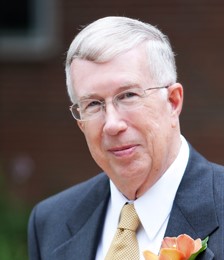Living After Loss by Dwight Tawney
The advice came slowly at first. There were the reassuring hugs, the endless array of casseroles that appeared on my doorstep, and a mailbox overflowing with letters of condolence and gentle encouragement, suggesting that I would “get through this.”
I had lost my dear wife of 35 years after her courageous year-long battle with ovarian cancer. She had been determined to see our son through his marriage and our daughter through the birth of a second grandchild, and she accomplished both tasks with the grace and charm that had marked her life. When she died it seemed that my grief took many forms as time itself crept by. There was the loss of her gentle touch and warm embrace, the loss of love and friendship, the loss of those many roles she had played in our relationship, the loss of those little intangible gestures only peripherally apparent until they are gone.
I thought I knew all about the stages of grief. As a pastor completing seminary in 1972, I had been well steeped in the tradition of Elizabeth Kubler Ross’s 1969, “On Death and Dying”. Imagining that I would traverse those stages of grief – denial, anger, bargaining, depression, and acceptance – I settled back to await the unveiling of the process.
In the meantime, all manner of well-intentioned advice began to emerge from that great cloud of faithful congregants who surround me with their love and concern. Their objective was clear – the time had come for me to “move on.” While it seems to be true that life moves on, very often we long for the way things were. We haul out the photographs, reimagine our histories and project what might have been. I suppose that a part of our support network’s gentle nudge to “move on” lies in their discomfort at the sight of our pain. It is hard indeed to watch someone you care about suffer so deeply.
There was no particular moment in which everything changed for me. No one event that transformed my life. No single experience I can point to and declare “that was the moment when I moved on.” Life was much messier than those Kubler Ross boundary markers I had come to expect. My emotions were a Vitamix of ingredients that churned with the days. Grief was not something I could put behind me or burry out of sight. Instead, what ultimately gave me strength and comfort was the realization that grieving merges into the complex of memories and experiences that are truly “you.” It is not as though you are suddenly done grieving and will never grieve agin, but rather you learn to incorporate the hard parts of loss into all the wonderful panoply of experiences and emotions that mark out your life.
In time I did enter into a new relationship with a most loving and caring woman who had also experienced the profound loss of her spouse. These past ten years have been marked by a new sense of joy and fulfillment. In that sense I did move on, but a new loving relationship has never meant forgetting the painful experiences of the past. Instead, moving on has involved learning to live a full and happy life while remembering and honoring the one you loved so deeply.
We must all handle loss in our own way, I suppose. For some that may mean traversing a whole range of responses from denial to acceptance. For me, the way forward has meant that I am not suddenly done with grieving and will never grieve that way again. Instead, I can remember the love that has marked out my past and with the help of friends and with grace miraculously given, move into the fullness and beauty of the life you get to live.
Rev. Dwight Tawney served as administrative pastor at Village Presbyterian Church in Prairie Village, Kansas for 24 years. He maintains a passion for archaeology and a deep commitment to environmental sustainability. Tawney majored in biology and philosophy at Florida Presbyterian College in St. Petersburg, Florida and graduated from Pittsburgh Theological Seminary in 1971. He has served churches in Monmouth, Illinois, Tulsa, Oklahoma, and Ft. Worth Texas. Dwight has participated in several archaeological digs in Israel and served as president of the Sustainable Sanctuary Coalition of Kansas. Rev Tawney retired from Village Church in 2014, but continues to teach archaeology and church history throughout the Kansas City area.

